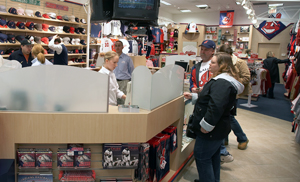Sports fans don’t think twice about buying tickets online. Nobody knows the exact number, but roughly 90 percent of single-game ticket sales in North America are conducted via the Web, according to teams and ticketing vendors.
For the remainder of the ticket-buying public, however, a small slice of the population still would rather speak to somebody face to face when buying a ticket. For that reason, many MLB teams continue to provide retail outlets as an “over-the-counter” alternative to online transactions.
“It’s an emotional buy; it could be someone who has been saving up for a long time and they want to find out if the person selling them that ticket has been to the building and sat in that section,” said Jack Lucas, president of TicketsWest, a ticketing company tied to about 200 retail outlets in the Pacific Northwest and Western U.S. “So many people still want that experience of buying a ticket from a person, and retail sales is like that. It is a good way to support your overall ticket operation.”
 |
CLEVELAND INDIANS
The Cleveland Indians’ Team Shops had sold nearly 50,000 tickets through mid-May.
|
Tickets West, based in Spokane, Wash., has deals with three supermarket chains, King Soopers, Rosauers and QFC. King Soopers, a longtime partner with TicketsWest, has 125 stores alone that sell tickets for Colorado Rockies games at Coors Field in Denver. The Rockies have offered that ticketing option since the club’s inception in 1993, said Greg Feasel, executive vice president and chief operating officer.
The Rockies’ business at King Soopers accounts for 25 percent of TicketsWest’s total sales at the retail level, Lucas said. The Rockies sell two kinds of tickets at King Soopers: full-price tickets and promotional tickets. Customers, for example, can purchase four outfield box tickets at a discount when they buy $25 worth of groceries. The revenue is split between TicketsWest, King Soopers, the Rockies and Ticketmaster, the team’s ticketing firm at Coors Field.
For King Soopers, the deal makes sense because the supermarket gets a leg up on the competition by offering a service the others do not and it drives incremental grocery sales connected with the promotional ticket offers, Lucas said.
“Some people would have you believe retail outlets are old-fashioned, and people have been telling me it has been going away now for 20 years,” he said. “But one of the first things potential clients ask me is, ‘How many outlets do you have?’ It is still a topic of conversation.”
On their own, the Rockies operate six Colorado Rockies Dugout Stores in Greater Denver. In addition to buying merchandise at the stores, fans can purchase single-game tickets and season-ticket holders can exchange tickets they can’t use for other games.
The retail arrangements have paid off for the Rockies. At the Dugout stores alone, ticket sales early in the 2011 season have jumped 40 percent compared with 2010. Ticket sales at King Soopers stores continued to grow as well.
“Every year you would think that more people would continue to migrate online to buy tickets, but we have seen double-digit increases over last year from those outlets,” Feasel said.
In Cleveland, the Indians’ six Team Shops in northeast Ohio are flourishing after the Tribe surprised all of baseball by becoming the first club to win 20 games in 2011. As of mid-May those retail outlets had sold nearly 50,000 single-game tickets, a 33 percent increase over the first six weeks of the 2010 season, said Curtis Danburg, the Indians’ director of communications and creative services.
“Because of the hot start and our low season-ticket base, our walk-up crowds and ticket office lines have been difficult to handle, so we’ve really been pushing the message to buy in advance, which I think has assisted our Team Shops,” Danburg said.
In Minneapolis-St. Paul, the Twins have sold single-game tickets since 1987 at three Twins Pro Shops strategically placed in suburban malls. Besides the convenience of the locations, fans can enjoy that “feeling of connectivity” and save a few bucks on ticket charges, said Twins President Dave St. Peter. The Twins charge a $1 fee per ticket sold at the pro shops compared with $3.25 charged for every ticket bought online through Tickets.com, the team’s ticketing firm.
The number of tickets sold at those outlets decreased last year compared with 2009 due to the high number of season tickets and group tickets sold for games at Target Field, the Twins’ ballpark that opened in 2010, St. Peter said. Last season, Twins fans bought 35,336 tickets at the three pro shops after purchasing 85,300 tickets from those outlets in 2009. Delaware North Sportservice, the Twins’ food and retail concessionaire at Target Field, took over the pro shops last season and the club expects the firm to sell the same number of tickets it did last season.
The drop in sales does not diminish the importance for the Twins to keep those pro shops open as a key part of their marketing and outreach efforts. “The stores ultimately provide incremental points of contact with our fans,” St. Peter said.
In New York, six Yankees Clubhouse stores now operate in Manhattan that sell single-game tickets for Yankees games. The latest location opened in April in Times Square. Lids Sports Avenue operates all six stores on behalf of the Yankees with three locations within a block of each other in the heart of the city’s tourist district.
Much of the stores’ target audience is first-time visitors to New York who would like to attend a Yankees game and need “hand-holding” to get them safely to Yankee Stadium, said Marty Greenspun, the team’s senior vice president of strategic ventures. Without disclosing numbers, all seven outlets do “extremely well” in ticket sales, he said.
Separately, Modell’s Sporting Goods’ Times Square location sells half-price tickets for day-of-game sales after signing a deal with the Yankees late in the 2010 season.




